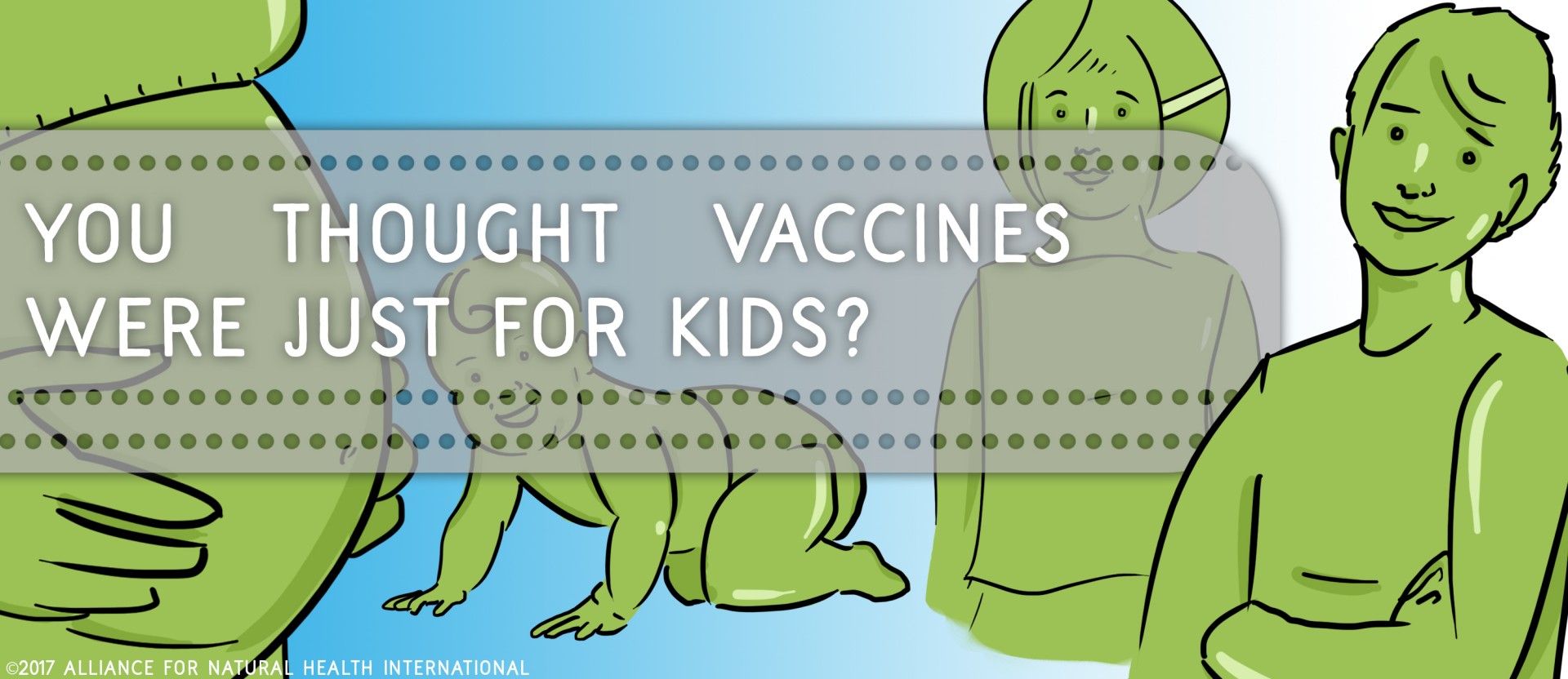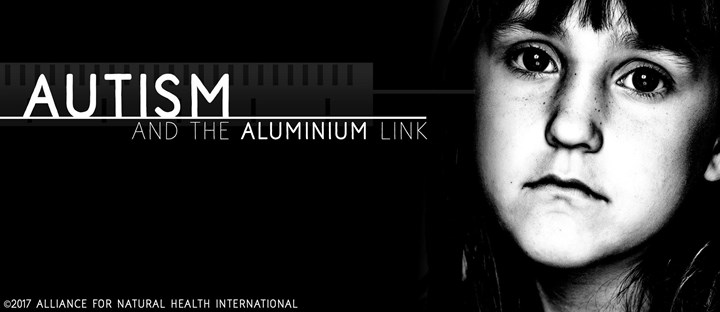Content Sections
Vaccines aren’t just for kids, and many adults don’t know they are vulnerable to vaccine-preventable diseases. At least that’s what the National Adult and Influenza Immunization Summit (NAIIS) would have you believe.
We’ve all got used to public health policy that is putting increasing pressure on vaccines that aim to prevent particular diseases in children despite mounting evidence of unpredictable and serious side effects in some. We’re now being told that adults of all ages are being overlooked and should be afforded the same access to vaccines so they can also benefit.
Vaccines for Life
It used to be that once you were vaccinated that was that, unless you needed a tetanus booster or travel vaccinations. Now we’re being told vaccinations lose efficacy over time, that we need to be protected against flu, shingles, chickenpox, HPV, pneumonia, Hepatitis A and B, meningitis, Haemophilus influenzae type B etc. The list goes on. In the US, UK, Australia and Germany (amongst others) adult vaccination schedules are included as part of government vaccine strategies. These recommendations don’t of course include the additional vaccines required or recommended prior to travel to certain parts of the world.
Vaccine pincer movement
For many years it was recognised that pregnant women should not be vaccinated due to possible risks to the developing foetus. No longer. It’s now becoming standard practice to administer vaccines pre-, during and post-pregnancy. Vaccination continues through childhood into adolescence and beyond. To make sure no-one is missed, health authorities are now targeting the elderly population not only with flu jabs of dubious efficacy, but also with pneumonia and shingles vaccines and moving down the age groups until they ‘meet in the middle’ and everyone is covered.
Vaccinate…..or we’ll make you fail
Many are rightly concerned about mandatory vaccination and the increasing difficulty of getting exemptions as a result of a medical history of sensitivity, or other reasons. But applying sanctions that deprive a person of their right to work or study in their place of choice is a deeply disturbing trend. In certain professions, especially in healthcare-related fields, employees in the US are being told their job could be at risk if they are not vaccinated. However, a recent study has called such mandatory vaccination of healthcare workers into question (in relation to influenza vaccination) in part because the risks of not being vaccinated and the benefits of vaccination to hospital patients have often been greatly exaggerated.
In the UK, we’ve been in communication with a university student who has lost his place on a course at Cardiff University because he was unvaccinated and refused vaccination. Once his unvaccinated status became known to the School of Healthcare Sciences he then entered a world of deception, discrimination and delays in addressing his case. He was inappropriately taken into a Fitness to Practise Procedure when all that was required was to undertake a Risk Assessment to confirm his state of health, that he was free from infection. Remarkably, despite all the issues he encountered he completed his first year of university. Unfortunately however, due to the ongoing delays and continual refusal to adhere to correct procedures within statute policy, his case has still not been properly addressed, he has now been removed from the course and is unable to return.

Is it really about our health?
The global vaccine market is predicted to rise to more than $70 billion by 2024. It is one of the fastest growing market segments and it’s now adult vaccines that are the main driver of this growth. This is evident in the messaging now being promoted around the use of adult vaccines, use of systems by medical practitioners (supported by Big Pharma) to ‘encourage’ vaccination in adults, publications regarding adult vaccination and support for organisations promoting adult vaccination by Big Pharma.
There are precious few data to inform us what the overall impact of this level of lifelong vaccination might be. It seems, with the desire to grow vaccines as a primary healthcare strategy, the notions of evidence-based medicine have been largely sidelined. How long will it be before we establish if mass, lifelong vaccination might actually depress our natural immunity, putting us more, rather than less, at risk?
Act now
Despite repeated assertions from healthcare authorities that “vaccines are safe”, vaccines, like all drugs, carry their own risks, many of which are inadequately communicated to those receiving vaccines.
A starting point for informed consent and choice over vaccines is the provision of accurate information on risks and benefits. In nearly all parts of the world, we’re currently a long way from this point.
If you believe health authorities should not be routinely and indiscriminately referring to vaccines as ‘safe’, please sign our petition now!
Forward widely and help your adult friends and colleagues learn more about the push on adult vaccination.









Comments
your voice counts
13 September 2017 at 6:12 pm
It is a widely held belief "I believe" that the main reason for vaccinating the world is ultimatly based on a financial return on the investment of developing the drugs administered. But are there any figures of how much profit is made by the manufactures based on percentage population vaccinated. Also is this figure broken down into medical incentives to innoculate, distribution, production etc vs cost of caring for the population that become ill when not vaccinated? Also lost person hours at work through ill health identified by the particular issue the vaccination is focused on? Im guessing if there is it is hidden or difficult to differentiate.
14 September 2017 at 2:37 pm
Hi Caroline
That's a great question and as you say one that's difficult to answer. The way information is communicated has changed in recent years and where we could get this type of information fairly easily previously it is now much more challenging to find in a usable format or from a reputable source. That doesn't mean we'll stop looking though and when find information that can be properly corroborated we will share it.
Warm Regards
Melissa
13 September 2017 at 7:01 pm
Respects people's choice for not being vaccinated!
13 September 2017 at 9:02 pm
Please tell me why I wasn't warned that I should not go near a child who has had the nasal flu vaccine for approximately 3 weeks. Could this be why I developed flu last winter for the first time in 20 years since I had the last flu injection and developed an auto-immune problem from which I have never completely recovered.
13 September 2017 at 9:18 pm
I am being pressured into receiving the flu vaccine this year. As the likeliest strain is to be the Australian variety and the vaccine doesn't cover it what is the point? Big pharma's profits?
20 September 2017 at 8:54 am
I find it really strange the an "Alliance for Natural Health" is publicising vaccines...
Everyone I know who has had the flu-vaccine is ill all of the time. Teach people how to look after themselves, not how to take medicine.
20 September 2017 at 9:46 am
Hello, thanks for your comment. The article is designed to draw people's attention to the increased use of vaccination in adults, rather then to promote the use of vaccination. Whilst we neither agree nor disagree with vaccination, we do believe everyone should enough information to be able to make an informed choice about whether or not to use vaccination.
We do agree that people should be promoting their natural immunity and be given information designed to help them promote their health naturally.
Warm Regards
Melissa Smith
Your voice counts
We welcome your comments and are very interested in your point of view, but we ask that you keep them relevant to the article, that they be civil and without commercial links. All comments are moderated prior to being published. We reserve the right to edit or not publish comments that we consider abusive or offensive.
There is extra content here from a third party provider. You will be unable to see this content unless you agree to allow Content Cookies. Cookie Preferences